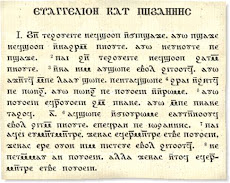A little over a year ago a noted Coptic scholar commented to me about the different ways in which Sahidic Coptic John 1:1c could be rendered appropriately in English. He said that the Coptic supports an indefinite English translation -- "the Word was a god" -- and less literally, an adjectival or "qualitative" one -- "the Word was godly/divine." What about the popular, traditional definite rendering, "the Word was God." Did the Coptic text support that?
"Tertium non video," this respected Coptic scholar replied in Latin. That is, "I do not see a third (possibility)."
Though Bentley Layton includes the traditional "the Word was God" in his latest grammar book, it is obvious that this is not equivalent to what the Coptic text says. Correctly, Dr. Layton renders Sahidic Coptic John 1:1c to read, "and past tense marker-a-god is the Word," or more smoothly, "and a god was the Word." This means the same as "and the Word was a god," as it would normally be expressed in standard English.
But if the indefinite phrase "and the Word was a god" is equivalent to the definite phrase "and the Word was God," then why have Christendom's apologists been accusing the New World Translation of bias all these many years???
Obviously, the Coptic's "and the Word was a god" is not equivalent to "and the Word was God."
The ancient Coptic version's indefinite grammatical syntax at John 1:1c does not support any definite translation like "the Word was God." That is not what those ancient translators saw and understood in their Greek texts.
Indeed, Tertium Non Video.
Friday, October 19, 2007
Subscribe to:
Posts (Atom)
